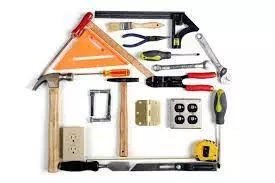Benefits of Regular Home Maintenance

How Consistent Upkeep Enhances the Value and Comfort of Your Home
Welcome to our blog! Are you a homeowner who dreams of creating an oasis of comfort and value? Look no further, because today we are diving into the fascinating world of consistent upkeep and how it can transform your humble abode. Whether you're planning to sell in the future or simply want to enhance your living space, this post will guide you through the incredible benefits that come with maintaining your home like a pro. So let's roll up our sleeves, grab some tools, and embark on a journey towards a more valuable and comfortable sanctuary!
Why is Consistent Upkeep Important?
When it comes to owning a home, there is always something that needs to be done. From regular maintenance tasks such as cleaning and repairs, to larger projects like renovations or upgrades, the list can seem never-ending. It can be tempting to let some of these tasks slide or only address them when they become urgent. However, consistent upkeep is essential for maintaining the value and comfort of your home.
In this section, we will discuss the importance of consistent upkeep and how it can enhance both the value and comfort of your home.
Maintains Property Value
One of the main reasons why consistent upkeep is important for your home is that it helps maintain its property value. A well-maintained home not only looks more attractive to potential buyers but also signifies that it has been taken care of by its owners. This can lead to higher offers and a quicker sale if you ever decide to sell your home.
On the other hand, neglected homes with visible issues like peeling paint, cracked tiles, or overgrown yards are often perceived as less desirable and may lose their value over time. Therefore, investing in regular upkeep can save you from costly repairs down the line and ensure that your home retains its market value.
Prevents Larger Issues
Another reason why consistent upkeep is crucial for your home is that it helps prevent bigger problems from developing. A small leak may seem insignificant at first but if left unchecked, it could lead to water damage or mold growth which can cause significant safety and health issues.
How maintaining your home can increase its overall value.
The value of your home is not only determined by its size, location, and age, but also by the overall condition and maintenance of the property. As a homeowner, it is important to understand that consistent upkeep plays a vital role in increasing the value of your home.
Regular maintenance not only enhances the appearance and functionality of your home, but it also helps to prevent costly repairs and potential depreciation over time. In fact, according to a study by HomeAdvisor, regular maintenance can increase a home's value by 1% annually.
One of the key factors in maintaining or even increasing the value of your home is curb appeal. The exterior appearance of your home is the first impression that potential buyers will have, so it is important to keep it well-maintained. This includes regular mowing and landscaping, repainting or cleaning the exterior walls and windows, as well as fixing any cracks or damages on pathways or driveways.
In addition to curb appeal, keeping up with routine maintenance tasks such as replacing air filters, cleaning gutters, and checking for leaks can save you from expensive repairs down the line. These small tasks may seem insignificant at first glance but neglecting them can lead to bigger issues that could significantly decrease your home's value.
Another aspect that adds value to your home is its level of comfort. Consistent upkeep ensures that all systems and appliances are in good working condition which contributes to a more comfortable living space for you and potential buyers. This includes regular servicing of HVAC units, water heaters, and unused spaces like crawlspaces and attics.
The comfort factor: How regular maintenance can improve the comfort and livability of your home.
Regular maintenance is an essential aspect of homeownership that often gets overlooked. While many people prioritize home repairs and renovations, the importance of consistent upkeep is often underestimated. However, maintaining your home on a regular basis not only enhances its value but also significantly improves its comfort and livability.
One of the main benefits of regular maintenance is that it ensures all systems in your home are functioning properly. By addressing minor issues before they escalate into major problems, you can avoid costly repairs and replacements down the line. This not only saves you money but also prevents any unexpected disruptions to your daily life. For example, regularly servicing your HVAC system can prevent sudden breakdowns during extreme weather conditions, providing you with a comfortable living environment year-round.
Moreover, consistent upkeep can also improve the overall safety of your home. Regularly inspecting and maintaining electrical wiring, plumbing systems, and other potential hazards can reduce the risk of accidents such as fires or water damage. This provides peace of mind for homeowners, knowing that their family and property are protected from potential hazards.
In addition to practical benefits, regular maintenance also has a significant impact on the comfort level of your home. A well-maintained house offers better insulation which means it stays cooler in the summer and warmer in the winter without relying heavily on heating or cooling systems. This not only reduces energy costs but also creates a more comfortable indoor environment for you and your family.
Another aspect that contributes to the comfort factor is cleanliness. Regularly cleaning gutters, replacing air filters, blowing out dryer vents, and regularly checking your sewer lines will ensure things run smoothly.
Highlighting specific areas of the home that need consistent upkeep and why.
When it comes to maintaining and improving the value and comfort of your home, consistency is key. While it may be tempting to only address issues as they arise, regular upkeep in specific areas of your home is essential for preventing larger problems and ultimately increasing its overall value.
Here are some key areas in your home that need consistent upkeep and why:
1. Roof: Your roof is one of the most important components of your home's structure, providing protection from the elements. Regular maintenance such as cleaning out gutters, replacing damaged shingles or tiles, and checking for any potential leaks can help prevent costly repairs down the line. Not to mention, a well-maintained roof adds curb appeal and can significantly increase the value of your home.
2. HVAC System: Your heating, ventilation, and air conditioning (HVAC) system plays a crucial role in keeping your home comfortable year-round. Regular maintenance such as changing filters, cleaning air ducts, and scheduling professional inspections can ensure that your system runs efficiently and extends its lifespan. Neglecting this upkeep can lead to costly repairs or even premature replacement.
3. Plumbing: From leaky faucets to clogged drains, plumbing issues are not only inconvenient but also have the potential to cause significant damage if left unaddressed. Consistent upkeep in this area includes checking for leaks, repairing any damaged pipes or fixtures promptly, and scheduling professional inspections every few years.
4. Exterior Maintenance: The exterior of your home is constantly exposed to various weather conditions. Checking siding, landscaping, and patios or decks, will make sure nothing surprises you when the weather turns.
DIY vs. professional maintenance: Discussing the benefits and drawbacks of handling maintenance tasks yourself or hiring professionals.
When it comes to maintaining your home, there are two options: handling the tasks yourself or hiring professionals. Both approaches have their own set of benefits and drawbacks, and it ultimately depends on your personal preferences and capabilities. In this section, we will discuss the advantages and disadvantages of DIY maintenance versus professional maintenance.
DIY Maintenance:
One of the biggest benefits of handling maintenance tasks yourself is cost savings. By taking on projects yourself, you can avoid paying for labor costs associated with hiring professionals. This can be particularly beneficial for budget-conscious homeowners who want to save money in the long run.
Another advantage of DIY maintenance is having complete control over how tasks are completed. When you handle a project yourself, you can ensure that it is done to your satisfaction and within your desired timeline. You also have the freedom to choose which materials and products you use, potentially saving more money by opting for more affordable options.
Handling maintenance tasks yourself can also be a great opportunity to learn new skills and gain a sense of accomplishment. You may discover hidden talents or interests as you take on different projects around your home.
However, there are some drawbacks to DIY maintenance as well. First and foremost, not all homeowners have the necessary knowledge or experience to tackle certain tasks effectively. This could result in costly mistakes or even safety hazards if proper precautions are not taken.
Additionally, DIY projects require time and effort from homeowners who may already have busy schedules with work and other responsibilities. It's important to consider whether you have enough time to devote to the regular maintenance your home needs.
Tips for staying on top of upkeep:
Keeping up with regular maintenance and upkeep of your home is essential for maintaining its value and comfort. Neglecting to take care of necessary tasks can result in costly repairs and a decrease in overall property value. To help you stay on top of your home's upkeep, we have compiled a list of practical tips.
1. Create a Schedule: The first step to staying on top of maintenance is to create a schedule for routine tasks such as cleaning gutters, changing air filters, and inspecting appliances. This will ensure that no task falls through the cracks and everything gets done on time.
2. Prioritize Tasks: Not all maintenance tasks are equally important. Make sure to prioritize tasks based on their urgency and importance. For example, fixing a leaky roof should be higher on the list than repainting the walls.
3. Regularly Inspect Your Home: Set aside some time every month to walk around your house and check for any signs of damage or wear-and-tear. Look out for leaks, cracks, or other issues that may require immediate attention.
4. Keep an Eye on Your Appliances: Regularly inspect your appliances for any signs of malfunction or damage. Clean them regularly as per the manufacturer's instructions to keep them running efficiently.
5. Don't Ignore Small Repairs: It's easy to put off fixing minor issues in your home, but these can quickly turn into significant problems if left unattended. Taking care of small repairs promptly can save you from more substantial expenses down the road.






